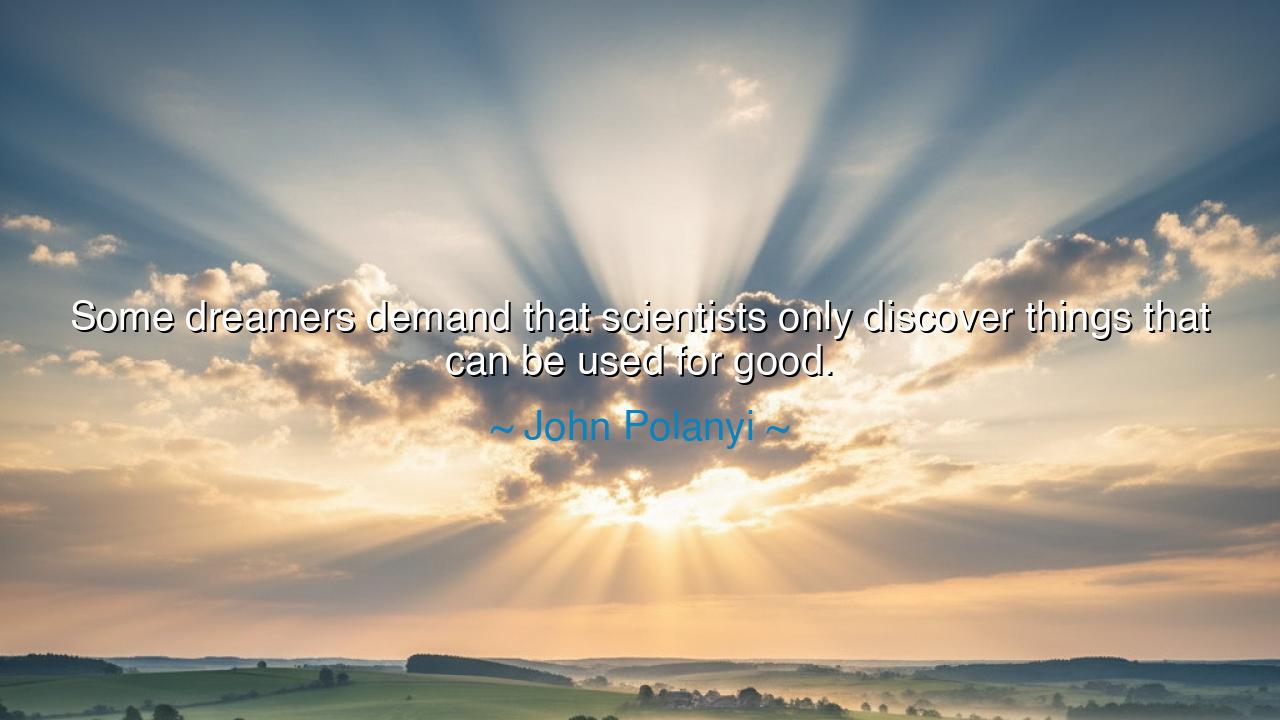
Some dreamers demand that scientists only discover things that






"Some dreamers demand that scientists only discover things that can be used for good." These words, spoken by the brilliant John Polanyi, strike at the heart of an ancient and eternal debate—the role of knowledge, the responsibility of discovery, and the consequences of human ambition. In this statement, Polanyi is calling attention to a profound tension: while science offers us infinite potential to improve life, it also carries the possibility of harm. The dreamers he refers to are those who envision a world where science is wielded only for the benefit of humanity, but they overlook the fact that knowledge itself, once discovered, is neutral—it can be used for good or for evil depending on the hands that wield it.
In the ancient world, the wise philosophers often wrestled with the idea that knowledge, while powerful, could not be controlled. Plato spoke of the philosopher-king, a leader endowed with wisdom who would use his understanding of the world to rule justly. Yet even Plato knew that knowledge was not enough; the person who held that knowledge must also possess virtue, or else that power could become a tool of oppression. Similarly, the Greeks saw that the gods themselves were not always benevolent, and the forces of nature could bring both creation and destruction. This ancient wisdom serves as a reminder that knowledge, once discovered, is neither inherently good nor bad—it is how it is used that determines its moral worth.
John Polanyi’s insight calls us to recognize that the potential of science is boundless, but it is also deeply entwined with human nature. The dreamers he speaks of wish to protect humanity from the dangers that may arise from new discoveries—yet science itself is not the enemy. It is how we choose to use that science that defines its impact on the world. Consider the discovery of electricity, a force that revolutionized the world and gave us light, communication, and countless other advancements. Yet, that same electricity also powers weapons of war, tools of destruction. The potential for good and evil exists in every discovery, from the smallest atom to the largest technology.
One of the most profound examples of this tension is seen in the development of the atomic bomb. J. Robert Oppenheimer, the father of the bomb, once reflected on the devastating power of his creation, saying, “Now I am become Death, the destroyer of worlds.” Here, we see the essence of Polanyi's statement: the discovery of atomic energy was, in many ways, an act of great scientific achievement, but the use of that knowledge led to destruction on an unimaginable scale. The bomb was a powerful tool, capable of ending the Second World War, but it also introduced the world to the terrifying reality of nuclear warfare. The dreamers who hope for discoveries used solely for good must confront the harsh reality that science can be used for both creation and destruction, depending on the motives of those who control it.
Yet, it is not all bleak, for there are countless stories where science has been used for profound good. Take, for example, the work of Louis Pasteur, whose discovery of the principles of vaccination and germ theory saved millions of lives. Penicillin, discovered by Alexander Fleming, transformed medicine and saved countless lives from infection. These are the bright examples of what happens when scientists dedicate themselves to the good of humanity. Science has the potential to heal, to improve, and to bring forth a better world, but only if it is guided by ethics, humanity, and a shared sense of moral responsibility.
Polanyi’s words also point to a deeper truth—that while scientists can uncover the mysteries of the universe, they cannot always foresee the consequences of their discoveries. Knowledge, in its purest form, is not bound by the intentions of its creators. It is a force, a power, that flows into the world and can be bent toward good or evil by those who harness it. The lesson for all of us is clear: we must not only value science for the gifts it brings but also take responsibility for the ways in which we use that knowledge. It is the duty of every generation to ensure that discoveries are not only made, but also guided by a sense of moral purpose.
The lesson for our generation, then, is to approach science with humility, wisdom, and responsibility. We must recognize that the discoveries we make today—whether in genetic engineering, artificial intelligence, or space exploration—hold immense potential for both good and harm. As we continue to unlock the mysteries of the universe, we must ask ourselves not just what is possible, but what is right. Our challenge is not only to make the next great discovery, but to ensure that it is used for the betterment of all, for the good of humanity, and not for destruction or selfish gain.
In your own life, consider the impact of your actions—whether in science, art, business, or in your relationships. How are you using your knowledge and power? Are you using it for the greater good, or for personal gain? Let Polanyi’s words be a reminder that knowledge is not just a tool, but a responsibility. As you discover, as you create, as you change the world around you, always ask yourself: is this discovery being used to make the world a better, more compassionate place? The dreamers may wish for a world where science can only be used for good, but the truth is that we must each take up the mantle of responsibility and ensure that the knowledge we wield is guided by the highest ideals of humanity.






AAdministratorAdministrator
Welcome, honored guests. Please leave a comment, we will respond soon